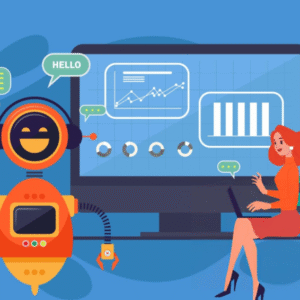Enterprise business applications are increasing, and so is their role in boosting business agility. They are helping companies adopt new business strategies and overcome challenges while uncovering different ways to save time and resources.
Mobile enterprise app development has, therefore, become essential for businesses this year, and it will only increase in importance, offering even more opportunities as we move into 2023.
7 Enterprise App Development Trends
Here is a list of top enterprise app development trends for 2023 that you can implement to shape your business and improve sales.
Predictive Analytics
Predictive Analytics uses various technologies, such as data mining, artificial intelligence, machine learning, and modeling, to gather data and forecast events based on it. One of the best examples of its use is that Netflix provides movie and TV show recommendations after collecting users’ watch history data.
Ultimately, predictive analysis helps enterprises predict what will likely happen through data patterns, enabling them to mitigate risks and capitalize on opportunities. This technology may well be the difference between success and failure in today’s cutthroat competition, proving that data has become an essential component of running a business nowadays.
Companies keep a close eye on their customer’s buying journey, collecting data related to their store visits, purchase frequency, order tracking, and when they last purchased from them. They can also store other customer-related data, such as complaints, defections, credit defaults, late payments, and fraud.
Analytics makes this data useful by providing essential insights to help companies understand and act on it to change business outcomes. You can expect its implementation to reach greater mainstream levels for far more mobile applications in 2023.
From helping businesses buy the right amount of stock to transforming the way businesses sell to customers, there are plenty of applications of this tech in business. Healthcare, fraud detection, predictive maintenance, and monitoring are just a few sectors where its implementation is set to increase dramatically throughout the coming year.
On-Demand Apps
On-demand app development will also be on the rise in 2023, if the success of applications like Uber and Airbnb are any indicators. These apps have already transformed the way businesses and users interact with each other. They have also successfully created jobs for countless people, and it is only a matter of time before the services and benefits from such apps will reach those beyond the tech-savvy enthusiast circle.
On-demand apps are available for business-to-business, business-to-consumer, person-to-person, and other business models. Such apps have proven useful for several verticals, including food, taxi, flights, hotels, dog-walking, and many more. Users save a lot of time and effort with an on-demand app, and that alone will, perhaps, continue to make it a trend next year.
Enterprises that choose to take advantage of on-demand functionalities are likely to benefit massively from this type of application, as they will gain the chance to widen their customer base. Furthermore, they will be able to incorporate additional features and users into their apps to make the app even more useful for everyone involved.
Compatibility with Foldable and Wearable Devices
Remember those flip phones when mobile phones first appeared? Times have changed drastically since then, and today’s flip and foldable phones are completely different from the ones we once used. In the past few years, top brands have launched phones with foldable screens that can expand or compress depending on user activity and preference.
Given their increasing popularity, such devices will likely evolve in the coming years, and companies have begun to build apps with them under consideration. The app should basically be capable of adjusting according to the screen display as it folds or unfolds without any issues.
You should also anticipate a rising trend regarding wearable devices and technology. Even though fitness trackers and smartwatches have been around for several years, they haven’t reached their full potential. In fact, their evolution and usage have been steadily growing over the years, creating several opportunities for companies looking to penetrate this market.
2023 will, therefore, see greater progression in enterprise app development in this category.
Internet of Things (IoT)
Technology has helped people improve their everyday life to a huge extent, and the Internet of Things is one of the biggest examples of this. Although it isn’t a new concept by any means, its applications have grown considerably, with mobile apps entering a variety of sectors, especially in the past decade.
The IoT is a clear indicator of the growing network of devices that give consumers the power to control and automate their operations through an internet connection. Mobile apps serve as the perfect medium to link users to their smart devices, of which smart home technology is a great example.
Homeowners can use IoT apps to stay connected with their smart devices and control them from remote locations. For instance, they can lock or unlock doors, activate home security systems, or adjust the thermostat before they reach their homes.
IoT-centered mobile app development will become more prevalent in 2023. A wide range of markets, including electronics, household devices, automobiles, display devices, and healthcare, are all markets to watch. They will also drive innovation and boost performance by contributing to digital representations of physical objects and processes.
There are many IoT platforms and tools available in the market which are used by app developers to provide effective IoT solutions.
Mobile Commerce
Mobile commerce has been a leading enterprise app development trend for a few years. Businesses are quickly growing interested in building mobile apps to increase revenue. This market offers plenty of opportunities to all types of businesses, including large retailers and personal brands.
Mobile eCommerce is a top feature companies highlight when pitching to clients, and it seems like every other day, businesses hire an enterprise app development company to create and launch new mobile applications.
The reason behind this is the greater reach of mobile apps. A mobile application allows customers to immediately access your brand and product offerings in a way that even websites cannot.
Although we are not yet at this point, mobile commerce apps are fast becoming a necessity for staying competitive. To keep up with giants like eBay and Amazon, every person and business selling online must emulate what makes those brands so successful. A mobile commerce app is one of the most effective ways to do so.
Augmented Reality (AR) and Virtual Reality (VR)
AR and VR have contributed to several apps in 2022 and will continue to be popular in the coming year. Augmented Reality has been successful due to its versatility: it has proven useful across a wide range of industries, including retail and manufacturing.
AR first became popular with Pokémon Go in mobile app gaming; since then, applications have been growing more practical year after year. From beauty salons and beauty product sellers offering makeup try-on to clothing stores providing trials through photo uploads, the use of this technology has been helping users make better decisions.
In addition, Google Maps offers a “Live View” feature that displays real-time turn-by-turn directions. With the device camera, the app can use landmarks and street signs to determine the user’s exact location.
Apart from the examples above, there are plenty of other ways to incorporate AR into mobile apps in 2023. For instance, enterprises could provide remote assistance with AR-enabled apps, or use them to transfer knowledge or in logistics.
You may also already be aware of the rapidly-growing number of apps using Virtual Reality lately. Enterprises are predicted to continue exploring this technology’s potential and utilizing it to solve some of their challenges. They are already using it in various fields, such as the corporate and education sectors, with a focus on delivering a user-centric experience.
Artificial Intelligence (AI)
While most people think of virtual assistants like Alexa or Siri when they hear the term, “AI”, there are far more applications of this technology in terms of app development.
In fact, AI has been part of mobile app development for years, but experts admit they have barely scratched the surface when it comes to understanding the extent of its application. Mobile apps can use Artificial Intelligence in the following ways:
- Speech recognition
- Image recognition
- Face detection
- Predictive maintenance
- Sentiment recognition
There are plenty of other use cases for Artificial Intelligence as well, which is why it will keep trending upward in 2023. One of its most prominent uses is in the field of cybersecurity, since it is capable of identifying malicious software and activities to help protect from potential threats.
Artificial Intelligence has also proven useful in spotting suspicious IP addresses and alerting at data breaches. Enterprises focusing on cybersecurity in 2023 can count on this technology to assist in hyper-automation that improves several functionalities and the overall quality of daily activities.
Additionally, AI helps with other aspects of software, such as conversational IT. This, in turn, proves advantageous for marketing, sales, and customer support.
2023: A Promising Year For Enterprise App Development
These are the seven most likely enterprise app development trends for the coming year. The advancement of these technologies will fuel these trends and help experts build secure apps that will provide maximum utility.
Enterprises can gain a decided advantage in their fields once they understand these trends and enlist the services of the right enterprise mobile app development company to capitalize on them.





